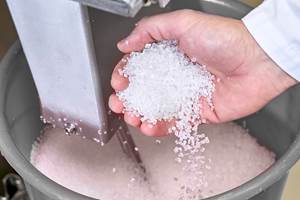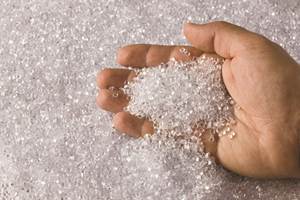Recycled Resin Prices Plummet
Oil prices are the reason. The effect could be less collection of recycled plastics.
The year 2014 proved to be a “so-so” year for recycled material markets, with maybe a bit of a bright spot in PP. While recycled resin prices were up and down, the oil-price slide at the end of the year almost immediately affected recycled resin pricing as well. While that may be good news for processors, who can now get virgin materials for the same prices as recycled materials, the environmentally conscious resin buyer may suffer in the end, as lower prices affect enthusiasm for collecting materials to be recycled.
R-HDPE PRICES SINK
Recycled resin pricing comes down in proportion to virgin resin prices. Lower oil prices started to affect all HDPE prices immediately. Recycled HDPE pricing was high in the early part of the Fall and stayed strong until the end of November, but now are down and recyclers expect more price decreases to come in 2015. “While there may be some situations where customers are committed to using percentages of recycled materials in their products, for the most part, when buying resin, it’s about what is going to bring them a better price. Why recycle HDPE if virgin prices are equal? We already have a situation where there is more virgin capacity than needed. Recyclers can’t really win the war.”
Says one analyst, “It gets to a point where recycle collection is affected by lower pricing. HDPE has been a bright spot for collectors, who have seen weak markets in paper and metal, but if oil prices get too low, collection will not happen in plastics either.”
RPET PRICES SOFTEN
2014 was an “okay” year for those selling recycled PET resin, but prices began to plunge at year’s end, particularly on the West Coast. “China bale prices have gone down; not sure if that has to do with oil prices, but they came down quickly. I believe those plunges have to do with the perception of the economy. The Chinese are dumping like crazy,” says one reprocessor.
The end of a year always brings a slow recycle market, but plummeting oil prices brought bale prices down even faster than usual. In December, West Coast bale prices were as low as 21¢/lb, down from 28¢ two months before. While that may sound like good news for buyers, lower prices don’t help in the long run because they affect availability of recycled material. The expectation is that the recycled PET market will continue to soften until oil prices level out.
New virgin PET resin plants are expected to break ground, despite overcapacity. Lamented one reprocessor, “No one really knows where this material will be sold. It’s a vicious cycle. If there was demand, prices would not be plummeting.”
LOWER R-PP PRICES ‘HEALTHY’
Recycled PP prices were quite high, so even if they come down 30¢/lb they would still command a very healthy price, notes one reprocessor. In December, the market already saw prices plummet on the raw-materials side. “Natural bales were at 57¢, now they are at 35¢. That’s only in five weeks,” this source commented. But he thinks PP may still be a bright spot for growth in recycled materials in 2015. “I think it will be a healthier market, once there is a price adjustment. I like it when prices are more realistic.”
Much of the growth in recycled PP is coming from Walmart’s call for recycled materials in its products. Much R-PP is generated from yogurt containers, apple-juice bottles, etc. Because of Walmart’s interest, “We are able to spark growth in collection,” says one reprocessor. “That’s how the cap and lid market was developed. It’s exciting to see the whole supply chain working for a common goal and seeing results.”
Related Content
Prices Up for All Volume Resins
First quarter was ending up with upward pricing, primarily due to higher feedstock costs and not supply/demand fundamentals.
Read MoreFundamentals of Polyethylene – Part 3: Field Failures
Polyethylene parts can fail when an inappropriate density is selected. Let’s look at some examples and examine what happened and why.
Read MorePrices of PE, PP, PVC, PET Largely Firm, Flat for PS
By most measures, pricing for the five commodity resins appeared to be holding firm going into the third quarter.
Read MoreDelivering Increased Benefits to Greenhouse Films
Baystar's Borstar technology is helping customers deliver better, more reliable production methods to greenhouse agriculture.
Read MoreRead Next
Lead the Conversation, Change the Conversation
Coverage of single-use plastics can be both misleading and demoralizing. Here are 10 tips for changing the perception of the plastics industry at your company and in your community.
Read MoreBeyond Prototypes: 8 Ways the Plastics Industry Is Using 3D Printing
Plastics processors are finding applications for 3D printing around the plant and across the supply chain. Here are 8 examples to look for at NPE2024.
Read More










